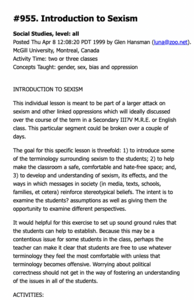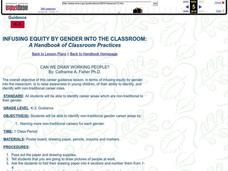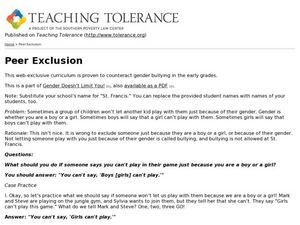Curated OER
Media Literacy Final Project
Students meet as a class to discuss a variety of media literacy topics before breaking into groups to conduct research on one aspect of the topic. In order to gather information, they watch episodes of the Simpson's television show and...
Curated OER
Making It Personal: Gender And Identity in Art
Eighth graders study the role of gender in art. They examine aspects of personal identity. They assess and utilize the properties of a variety of art media and their ability to convey messages and meaning.
Curated OER
Shades of Gray
Students examine their own strengths and weaknesses and try to determine if it is a result of nature, nuture or both. After reading an article, they discuss how gender may or may not account for differences in intelligence. They...
Curated OER
Digital Divide
Students research different "divides" and apply their research to the Digital Divide. They determine the race, gender and socioeconomic issues involved in this issue and why it is relevant.
Curated OER
The True Confessions of Charlotte Doyle
Students examine the breaking out of traditional gender roles in this story by Avi Wortis, The True Confessions of Charlotte Doyle. Gender limitations are explored in this activity.
Curated OER
Measuring the Impact of Exercise And Body Position (laying Down, Sitting And Standing) on Heart Rate
Seventh graders gather data on heart rate during exercise and at rest in three different positions. They compute male and female averages for each different heart rate and graph each and draw conclusions based upon the data about the...
Curated OER
Introduction to Sexism
Students develop an understanding of sexism, its effects, and the ways in which messages in society (in media, texts, schools, families, et cetera) reinforce stereotypical beliefs.
Curated OER
Leveling the Gender Playing Field
Students explore whether or not the gender 'playing field' is becoming more level. They share their views by responding to questions regarding changing attitudes about women and men in the past, present and future.
Curated OER
What do Scientists Do?
Eighth graders research the various roles in science. In this scientist's jobs lesson, 8th graders research a variety of disciplines and the types of careers in science. Students interview, gather evidence and contribute to a class book...
Curated OER
Gender Bias in Language
Twelfth graders study the issues between male and females. In this current events lesson, 12th graders read an article and answer questions. Students watch a video and write an essay.
Curated OER
Infusing Equity by Gender into the Classroom
Twelfth graders examine the different gender roles in the workforce. In this Social Studies lesson, 12th graders participate in a class discussion on their roles in society. Students write an essay.
Curated OER
I can do What I Want
Students recognize gender bias and stereotyping. In this self-esteem instructional activity, students listen to Amazing Grace by Mary Hoffman and discuss how girls can be successful and provide positive role models for others.
Curated OER
Can We Draw Working People?
Students examine non-traditional careers by gender. In this guidance lesson, students discover career options are not limited by gender. Students identify a career of interest to them and illustrate themselves.
Curated OER
Gender Disparity on Display
Students explore an article and discuss what gender differences. In this exploring gender lesson students divide into groups and develop a social theory.
Curated OER
Gender Shouldn't Limit You!
Students examine political gender biases. In this Teaching Tolerance lesson, students participate in a mock classroom election which requires them to vote for a boy or a girl. Students discuss the election results and gender bias.
Curated OER
Peer Exclusion
Students role play on how they could solve problems of boys and girls not wanting to include each other in their play. For this role playing lesson plan, students discuss the gender exclusion that sometimes happens on the playground and...
Curated OER
Gender, Age, and Health
In this gender, age, and health in American society worksheet, students respond to 7 short answer questions and answer 13 fill in the blank questions regarding their role in American culture.
Curated OER
Athletics Datafile
In this computer worksheet, students load and open a copy of ViewPoint and Olympics. They explore the data by identifying how many men and women are contained in the file and which country has the most files. Then they plot a bar graph...
Curated OER
Communication
High schoolers brainstorm the different ways about how to tell someone "no". Individually, they evaluate how they communicate with others and how they can improve. To end the instructional activity, they work with a partner to practice...
Curated OER
Issues of Gender
Students develop their own orginal artwork that represents their own ideas about gender. In groups, they discuss and design a tableaux that shows society's view on gender over time. Using any item in popular culture, they discuss what...
Curated OER
Female Poets Speak For Themselves
Student examine selected works of twentieth-century female poets that speak to the stereotypes about women inherent in Western culture. Individually, students explore these stereotypes and their experience with them. Students create a...
Curated OER
Sneetches
Students engage in a lesson that uses guided questions in order to help create cultural awareness among students. The use of gender is considered and the students reflect upon the answers of questions to learn social skills.
Curated OER
Provide His/Her Gender
Students write, speak and read his/her gender and the stress the importance of communicating this information accurately especially when completing forms or n various kinds of interviews. Included is a Gender Pre-Test, Gender Grammar...
Curated OER
Women's Rights Historic Sites
Students use maps, readings, floor plans, photos and cartoons to research the conditions of upstate New York in the first half of the 19th century, examine the issues that led to Women's Rights Convention of 1848 and consider current...

























